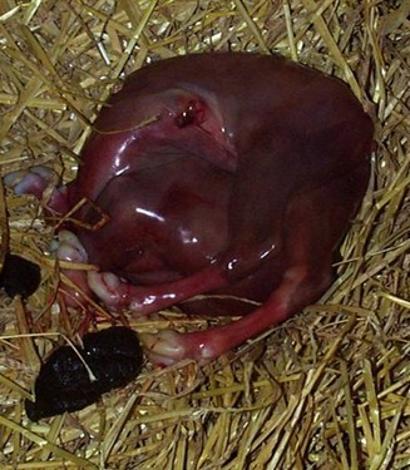 |
| An aborted bovine foetus. Neospora caninum infections in cattle may result in abortion. Photo courtesy of www.nadis.org.uk. |
|
| Neospora caninum is a protozoan cyst forming apicomplexan parasite that causes neosporosis, notably in cattle (Bos taurus) and domestic dogs (Canis familiaris). It is closely related to Toxoplasma gondii and has emerged as a major cause of reproductive failure in cattle world-wide. (A)
Neospora caninum is regarded as one of the most important infectious causes of abortion in cattle worldwide, yet there are no definitive studies that quantify losses due to neosporosis in the cattle industry; however, losses are estimated to be in the millions of dollars per year. The two major routes of N. caninum transmission are horizontal, where cattle ingest sporulated N. caninum oocysts and vertical transmission, which includes transmission of the agent to the foetus during pregnancy, either following reactivation of bradyzoites in the infected dam or de novo infection of the dam during pregnancy. (A)
Infection in dogs is generally acquired by consumption of bradyzoite-containing cattle tissues, particularly placenta and foetal membranes. Vertical transmission to puppies in utero may also occur. Clinical disease, including neorological signs and paralysis, tends to occur in puppies under 6-months of age. There is no definitive treatment, although control is best attempted before the onset of severe neurological signs, clindamycin or trimethoprim-sulpha preparations being the drugs of choice. (C)
Unlike it's feline counterpart Toxoplasma gondii, Neospora caninum is NOT known to affect humans.
A - For details on Bovine Neosporosis please click HERE for Dr. Patrick Craig's article "Neospora Caninum and Neosporosis".
B - Click HERE to read Dr. Craig's abstract for his PhD thesis: "The effects of the abortifacient parasite, Neospora caninum on bovine foetuses in early and late gestation."
.
C - Click HERE for more details on Canine Neosporosis.
ACKNOWLEDGEMENTS: Dr. Patrick Craig
|